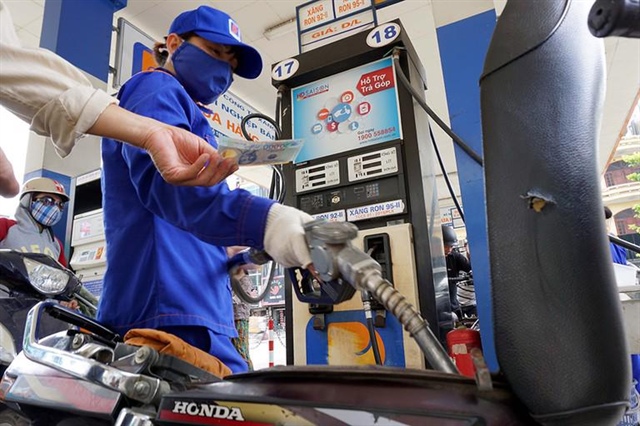Finance ministry proposes to halve excise, VAT taxes on petrol products
Finance ministry proposes to halve excise, VAT taxes on petrol products
The tax cut is scheduled to take effect in six months, subject to the approval of the Standing Committee of the National Assembly.
The Ministry of Finance (MoF) has proposed to halve the excise tax on fuels and an additional 50% cut in value-added taxes on all petroleum products.

A petrol station in Hanoi. Photo: Ngoc Thang |
The Ministry of Finance (MoF) has proposed halving the fuel excise tax and an additional 50% cut in value-added taxes on all petroleum products.
Under the proposal, a 50% excise tax cut would also apply to E5 and E10 biofuels. An additional deduction in value-added taxes (VAT) would apply to fuels, jet fuels, diesel, mazut, and kerosene.
The tax cut is scheduled to take effect in six months, subject to the approval of the Standing Committee of the National Assembly.
According to the MoF, amid growing volatility in the global petrol markets and countries worldwide are taking measures to curb rising inflationary pressure, tax cuts are necessary to support economic recovery and contain inflation.
In the first scenario proposed by the MoF, the ministry suggested a 50% tax cut in excise tax and 20% of the VAT for petrol and diesel products.
Assuming other factors remain unchanged, the price of each liter of biofuel E5-RON92 would be lowered by VND1,113 to VND21,118 (US$0.89), RON95 by VND1,313 to VND21,900 ($0.92), and diesel by VND439 to VND23,741 ($1).
If the proposal becomes effective in November, the MoF expects such a change would help reduce the consumer price index (CPI) growth in 2022 by 0.1 percentage points.
With an estimated crude oil price of $100 per barrel and current gasoline consumption in 2022-2023, similar to the pre-pandemic period, the Ministry of Finance expected a VND1.47 trillion ($62 million) decrease in state budget revenue per month.
This would result in a total of VND7.43 trillion ($313 million) in VAT and excise tax cuts for six months. Including a cut in environmental protection tax, the state budget would forego around VND41 trillion ($1.72 billion).
In the second scenario, the MoF suggested a 50% cut in excise and VAT taxes for petroleum and diesel products. Higher tax cuts mean the average CPI may decline by 0.15%, and budget revenues fall by a total of VND45.64 trillion ($1.92 billion).
Given its opinion over the MoF’s proposal, the Vietnam Chamber of Commerce and Industry (VCCI) said the move is the right timing to mitigate the negative impacts of price hikes in petrol products on businesses and people. The MoF should consider waiving the excise tax on petrol products in the long term.
“This could be the right step amid a sudden surge in prices of petroleum products on the global market,” stated the VCCI.
On July 11, the Government decided to cut the environmental protection tax on petrol products to VND1,000 per liter for fuel, and VND500-700 for diesel.
Currently, the excise tax rate on fuel is 10%, and a new change, if approved, would reduce the rate to 5%.
Experts argued that the excise tax applies to luxury products, or those whose consumption should be limited, such as cigarettes, alcoholic beverages, or automobiles but not petroleum products, an essential input to economic activities.
Therefore, the Government should consider the imposition of excise tax on such products.



















